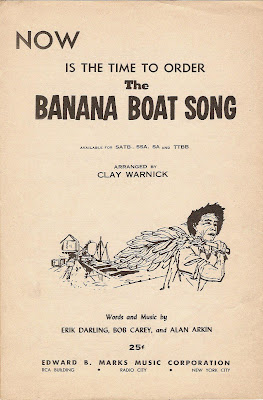Via
The Concert and
Deceptively Simple, a fine meme/questionnaire/procrastination aid.
The rules:
1. Put your iTunes/ music player on Shuffle
2. For each question, press the next button to get your answer
3. YOU MUST WRITE THAT SONG NAME DOWN NO MATTER WHAT
CAPITAL LETTERS! I MUST OBEY!
1. If someone says ‘Is this OK?’ you say?
"America" (Van Dyke Parks' arrangement from
Tokyo Rose).
There's a bright future for me in politics, apparently.
2. What would best describe your personality?
"Wonderful" (Sam Cooke and the Soul Stirrers).
Thanks, Sam! I left the money in your dressing room.
3. What do you like in a girl?
"Pu Pu Pa Doo" (The Gaynotes).
No way I'm touching that one.
4. How do you feel today?
Berg:
"Im Zimmer" from
Sieben frühe Lieder (Anne Sofie von Otter/Bengt Forsberg).
"When my eye rests so in yours, as quietly the minutes pass." I love you, too, computer!
5. What is your life’s purpose?
Britten:
"The Death of Nicholas" from
Saint Nicholas (the old Decca Britten/Pears recording).
Revenge shall be mine.
6. What is your motto?
"I Can't Go On (Rosalie)" (Fats Domino).
That's me—Samuel Beckett without the follow-through.
7. What do your friends think of you?
Poulenc:
"Toréador" (Michel Sénéchal/Dalton Baldwin).
Scoff all you want, but bolero jackets are making a comeback.
8. What do you think of your parents?
Brahms:
Symphony no. 2: III. Allegretto grazioso (quasi andantino)—Presto ma non assai—Tempo I (Wiener Philharmoniker/Bernstein).
Coincidentally, the tempo marking of pretty much every report card review of my childhood.
9. What do you think about very often?
Schumann:
"O wie Lieblich," op. 138, no. 3 (Dietrich Fischer-Dieskau/Jörg Demus).
My wife is distractingly cute, OK?
10. What does 2+2=?
"C'est Si Bon" (Don Byron, from
Don Byron Plays the Music of Mickey Katz).
Two plus two? It's all good!
L'chaim!11. What do you think of your best friend?
Adams:
"Landing of the Spirit of '76" from
Nixon in China.
Well, every time I go to his house, I do have to shake the hands of all his ministers.
12. What do you think of the person you like?
Donizetti:
"Voglio dire, lo stupendo elisir" from
L'elisir d'amore (Battle/Pavarotti/Levine).
It sure is.
13. What is your life story?
Wolf:
"Das Köhlerweib is trunken" (Elisabeth Schwarzkopf/Gerald Moore).
I was tricked by red wine. Is that an accepted legal defense plea?
14. What do you want to be when you grow up?
Tallis:
The Lamentations of Jeremiah: Ghimel. Migravit Juda propter afflictionem (Pro Cantione Antiqua).
Judah is gone into captivity because of affliction, and because of great servitude: she dwelleth among the heathen, she findeth no rest: all her persecutors overtook her between the straits. A restless, cranky old man. I'm well on my way.
15. What do you think when you see the person you like?
Bach:
"Ich folge dir Gleichfalls" from
St. John Passion (Elly Ameling).
I likewise follow you with eager steps and will not forsake you, my Light and my Life. Let it not be said that I don't know what's good for me.
16. What do your parents think of you?
"I Know You Got Soul" (Eric B. and Rakim).
Thanks, Mom and Dad! I left the money in your dressing room.
17. What will you dance to at your wedding?
Bernstein:
"A Boy Like That," from
West Side Story (original Broadway cast).
Not actually what I danced to at my wedding, and truth be told, I'm kind of kicking myself.
18. What will they play at your funeral?
"Que Sera, Sera" (Sly and the Family Stone).
How do you sum up a man's life?
Meh.19. What is your hobby/interest?
"Keep Your Hand on the Plow" (Mahalia Jackson).
Wait, I have to get something to
pull the plow, too? No wonder nothing's growing.
20. What is your biggest secret?
"I Don't Like Mondays" (The Boomtown Rats).
That's no secret! Well, the shooting part, maybe.
21. What do you think of your friends?
"Heard It Through the Grapevine" (The Slits).
As soon as they read this post, they'll find out on the sly.
22. What should you post this as?
"Last Fair Deal Gone Down" (Robert Johnson).

























